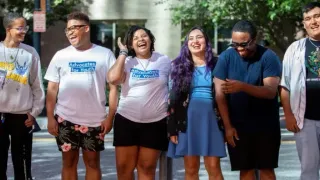June 25, 2016
Program Aims to Curtail Binge Drinking
Mathew S. Bajko READ TIME: 5 MIN.
His weekend bar jaunts began as a way to decompress from his hectic weeks juggling a part-time job while attending graduate school to earn a master's in physics. A major component of his revelry involved alcohol consumption.
And at first, Frankie didn't pay much attention to his waking up the next morning and being unable to recall the goings-on of the night prior.
"My friends and I would just think we must have had fun last night," said Frankie, a gay San Francisco resident who asked that the Bay Area Reporter not disclose his last name.
The consequences of his drinking become more serious, however, with Frankie waking up one time a few years ago in a hospital emergency room with no recollection of how he ended up there. He was told passersby had found him passed out on the sidewalk in the city's gay Castro district.
Last year he ended up in the drunk tank after a night out.
"By the fall of 2015 it was getting really bad. I was blacking out every weekend. One weekend I woke up under a freeway overpass and had my wallet and phone stolen," recalled Frankie. "I remember waking up thinking, 'Again? Great, I did it again.' The next weekend I went out and tried to control my drinking. But it had escalated again, and I woke up in the emergency room."
Altogether, Frankie, who is now 26, has been admitted to emergency rooms four times due to excessive drinking. He doesn't consider himself to be an alcoholic, however, merely a binge drinker, which researchers define as consuming five or more drinks in one setting.
"I don't have days where I need to have a drink," he said. "I don't drink every day."
Unsure of where to turn for help, Frankie happened to mention he wanted to improve his drinking habits during a regular checkup at Magnet, the San Francisco AIDS Foundation's health services program for gay and bisexual men in the Castro. His counselor referred him to the agency's Stonewall program, which provides counseling and support services to substance users.
It had recently launched a new weekly Smart Drinking Group for gay and bisexual men, and Frankie attended his first meeting in January. The experience proved to be helpful, and Frankie has routinely attended the Tuesday evening meetings ever since.
"I felt I was doing something finally about my drinking," he said. "To my mind the best way to deal with the problem is to learn about it. I feel like alcohol is an enemy I am dealing with. I need to find out about that enemy as much as I can."
Study Data
Studies have found that Frankie is not alone in terms of gay and bisexual male binge drinkers. And various reports over the years have shown a correlation between excessive alcohol consumption by men who have sex with men and rates of HIV and other sexually transmitted diseases.
"We know bars are important places for people to meet and have a good time. We want people to do that," said Jen Hecht, SFAF's interim senior director of programs and services. "We also have data from the city and our own research that suggests greater than 65 percent of MSM in San Francisco report binge drinking at least monthly."
Using data from the 2011 National HIV Behavioral Surveillance, which surveyed gay and bi men in 20 cities, including San Francisco, researchers of a study published in the February 2015 issue of the Drug and Alcohol Dependence journal found 4,008 HIV-negative gay and bisexual men who reported binge drinking.
They accounted for nearly 50 percent of the men included in the study. And 1,720 of the men, or 21 percent of the study cohort, reported drinking five or more drinks on a typical drinking day.
Men aged 25 to 34 were "significantly higher," at 63 percent, to be binge drinkers, according to the study, as were non-Hispanic whites (63 percent) and Hispanics (61 percent). The study, "Binge Drinking and Risky Sexual Behavior among HIV-Negative and Unknown HIV Status Men who have Sex with Men, 20 U.S. Cities," also found that binge drinkers engaged in more condomless sex than non-binge drinkers and were more likely to exchange sex for drugs or money and to have concurrent partners.
"This suggests that binge drinking potentially affects more than just the decision to use a condom during sex. It is associated with a wide range of sexual risk behaviors," stated the study, whose lead author was Kristen L. Hess.
Services Expanded
Recognizing that binge drinking is a growing concern, SFAF has been expanding its services in order to assist gay and bisexual men in managing their alcohol consumption. In addition to the weekly groups, which take place from 6 to 7:30 p.m. Tuesdays at Strut, the gay men's health center in the Castro, there are also walk-in individual sessions available on weekdays at 4 p.m.
"We want to provide a safe space where people can address their alcohol consumption from a non-threatening perspective," said Richard Lugo, a substance health services counselor at Stonewall who oversees the Smart Drinking Group. "We don't want people to feel ashamed or think they have a problem if they don't think that."
This year the agency received $150,000 from the city's Department of Public Health to help cover the cost of Stonewall's binge drinking program and will receive $200,000 next fiscal year, which begins July 1.
It is also working with local health officials on the PACE Study, short for Pacing Alcohol Consumption Experiment, and is aiming to enroll 240 gay and bi men into the Single Intervention Project, or SIP for short, which involves a 60-minute session to discuss their drinking, a follow-up session a month later, and a final evaluation after three months.
"It is more about being a partner of members of the community than trying to steer them away from their usual activities," explained Lugo.
SFAF has also partnered with bars in the Castro on ways they can assist their patrons, from providing free water to posting messages that encourage people to slow down their drinking. As for bargoers, the agency recommends taking a set amount of cash when going out and leave the ATM and credit cards at home.
Other suggestions include alternating alcoholic drinks with non-alcoholic ones and skipping mixed drinks, whose alcohol content is hard to control, and ordering beer or wine instead.
"What we know is that, in our community, it is exceedingly easy to drink to a high level," said Hecht, citing heavy pours and cheap drink specials. "It can be hard to stick to your limits."
To avoid blacking out when he drinks socially at a party or bar, Frankie now restricts himself to only consuming beer and has a cap of 15 drinks a week.
"It works well for me. If I am at a party Friday night and know I am going out Saturday, I try to conserve how much I drink," he said.
And he continues to work with a counselor to delve into the reasons behind his binge drinking. Some of it has to do with overcoming his shyness, and another is realizing how quickly alcohol takes effect on him.
"My ultimate goal from this program is to build a set of skills and habits I am building for myself. So when I go to a bar, it is second nature to have a beer and limit my drinking," he said.
For more information about SFAF's programs for binge drinkers, call (415) 437-3439.






